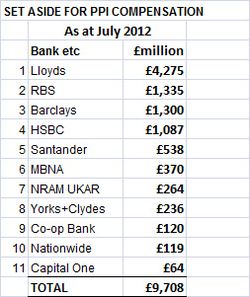
I was amused to read the story about Barclays Bank making all of their staff watch a video about how not to rig interest rates recently.
This followed the LIBOR scandal, and is a 12 minute piece to camera starring interim Barclays CEO Rich Ricci, Bob Diamond’s other right hand man at the bank after Jerry Del Missier resigned.
According to CNBC:
The video runs about 12 minutes. It begins with Rich Ricci, the chief of Barclays’ investment banking arm, explaining that because the topic of Libor is so complex, he is going to read from a teleprompter, according to a person who has seen the film.
Ricci states that he wants to make sure he gets it right “in the interests of transparency,” the person said.
“This is just silly,” said one Barclays employee while watching the video.
Another Barclays employee said that the purpose of creating the movie is to make sure “everyone understands what happened, what we’ve done about it, and what we must do to make sure it never happens again.”
Many Barclays employees in New York City are veterans of Lehman Brothers and are understandably cynical about attempts by senior executives to repair the image of the bank.
“Good lord. This is just to provide cover so that Ricci can tell the FSA that he made us all watch this film,” one employee said.
The employee explained that Ricci plans to meet with British regulators next month and wants to be able to claim that “every single person at the firm has seen it.”
So there it goes.
I was amused as it reminded me of another story I heard this week.
A graduate recently joined one of the UKs largest banks to help them process PPI claims.
PPI is the payments protection insurance that was bundled into all bank deals during the 2000’s and has now cost the industry almost £10 billion in compensation for mis-selling.
According to Paul Lewis, the Top 11 banks have set aside £9.7 billion for claims.

That’s way up on the estimates of just a year ago, and much of this is in the internal costs of processing.
For example, Lloyds stated that it cost them £1 billion just in processing as every other claim is fraudulent or false.
Anyways, back to the graduate.
She’s joined the bank and starts processing the paperwork.
To do this, every staff member must complete a test to prove they are competent to process the claims.
However, with the burden of documentation and challenge of getting staff, the team leader gave all staff members the answers to ensure they would get through the test fast and on to processing.
It reminded me of the story of Shelley Hunt, who found that Citibank had to process so many mortgage applicatiosn so fast that three out of five were processed with incorrect information, missing signatures or missing documentation.
When time is short and processing is voluminous, quality standards disappear out of the window.
It also reminded me of the post-Enron Sarbanes-Oxley changes to American corporate life.
One of those changes affected me personally as we suddenly had to complete ‘ethics training’ every year.
This involved watching a video and then taking an online test to complete the process.
Every employee had to go through the process, but most thought it so laughable that they would outsource the whole thing to one team monkey who would complete the test for all.
In other words, ethics is not something you create by a video and a test.
You create ethics through a culture and a standard of who you hire and how you manage them.
That’s another thing we’re all starting to realise.
Find an honest bank and test them through trust, not completing a tickbox questionnaire.
Chris M Skinner
Chris Skinner is best known as an independent commentator on the financial markets through his blog, TheFinanser.com, as author of the bestselling book Digital Bank, and Chair of the European networking forum the Financial Services Club. He has been voted one of the most influential people in banking by The Financial Brand (as well as one of the best blogs), a FinTech Titan (Next Bank), one of the Fintech Leaders you need to follow (City AM, Deluxe and Jax Finance), as well as one of the Top 40 most influential people in financial technology by the Wall Street Journal's Financial News. To learn more click here...





















